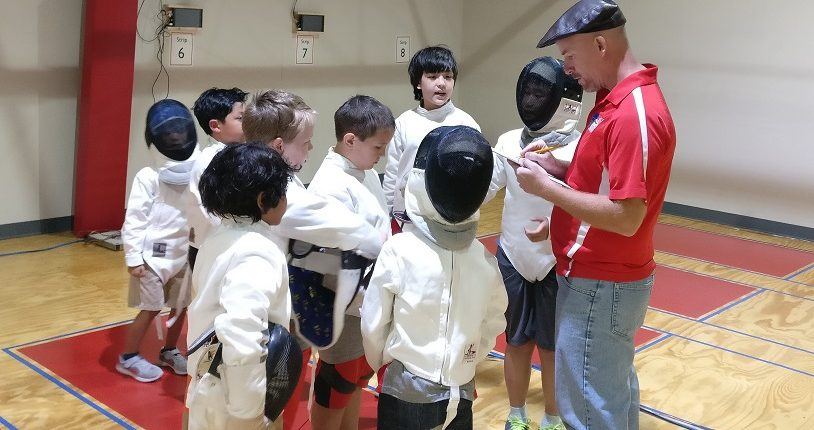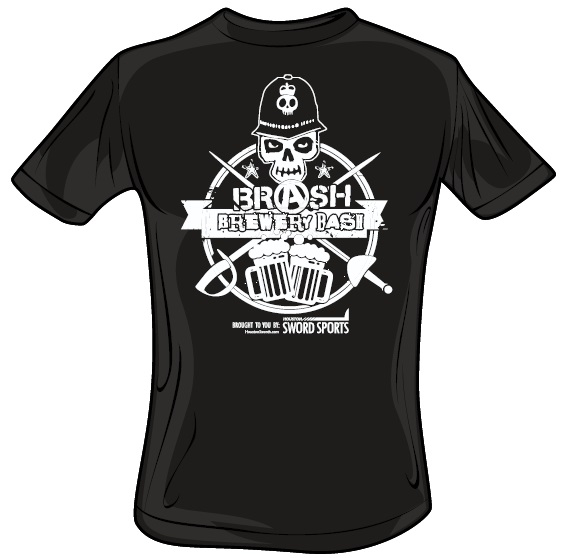Going to Tournaments? Here’s What You Need to Know

Gather round and learn what you need to know about tournaments!
We had a tournament information meeting last Saturday, and discussed the ins and outs of attending your first tournament, plus useful information for those who’ve been to a few. Read on to learn more!
We’ve got a tournament coming up soon – register today and you can put all of the following information to good use!
Houston Sword Sports St. Patrick’s Day Tournament, March 17-18
Signing Up
To participate in a tournament, you must be a member of USA Fencing. Memberships last until July 31st each year. Many novice and Y8 events only require the non-competitive membership; most require the competitive membership. To sign up, visit https://member.usfencing.org/. Be sure to list Houston Sword Sports as your primary club and the Gulf Coast Division for your division.
To see upcoming tournaments, sign up, and check your results, go to https://askfred.net/. Currently most small, local tournaments use this system. Larger tournaments like ROCs, RYCs, RJCCs and NACs are handled through https://member.usfencing.org/.
When you sign up for a tournament, email the coaches to let them know. If a coach is available for a local tournament, they will attend to support our fencers. For out-of-town tournaments, sending a coach will depend on some other factors, and all fencers will need to pay a coaching fee.
Tournament Classifications
Tournaments are divided by four categories: weapon, age, gender, and rating.
Weapon is foil, epee, or saber. Each has its own rules and scoring areas, so you won’t see an event with foil vs epee, saber vs foil, etc. All of our classes start fencers with foil, but each weapon has its own personality, so try them all over time.
Age is broadly youth (Y-8, Y-10, Y-12, Y-14), teen (Cadet or Junior), open (13+), or veteran (40+). All ages are based on birth year, check out our post here for more info on this https://houstonswords.com/news/age-classifications/
Gender is male or female, usually not too tricky. Mixed means the tournament is open to all.
Rating is a letter, E through A, that’s earned by placing high enough at a tournament of a certain strength. Tournaments can be restricted to fencers who are unrated, E and Under, Div 3 (D and Under), Div 2 (C and Under), Div 1A (open or any rating), or Div 1 (C and above). Most tournaments are Div 1A, aka open, by default. There’s also a novice classification that applies to people who’ve been fencing for less than 1 year.
What do you need for a tournament?
| All Fencers | Foil | Epee | Saber |
| Knee socks
Fencing pants Chest protector (for girls) Underarm protector Jacket Glove* |
2+ working foils
2+ working body cords 2+ working head cords Foil lame Foil mask |
2+ working epees
2+ working epee cords Epee mask |
2+ working sabers
2+ working body cords 2+ working head cords Saber lame Saber mask FIE saber glove with conductive cuff OR FIE glove and manchette |
*Foil and epee fencers do not need FIE gloves, but saber fencers do.
Where can I get all this stuff?
For novice events and HSS’s in-house tournaments, you can borrow items from the club (first come, first served). For other tournaments, you will need your own equipment. We recommend http://www.absolutefencinggear.com/ for entry-level fencing gear. If you need more information about product recommendations and sizing, ask the coaches.
What else do I need to know about the stuff?
Michael Mergens has a great booklet called The Care and Feeding of All Things Fencing: A Parent’s Guide. It’s a great starting point for taking care of your equipment and available free at the club. If you want to outsource your equipment maintenance, Michael is at the club most Tuesdays and Thursdays and can check your gear for you. All gear needs to be checked for function and holes before a tournament. Try to check it at least a week in advance to give you a chance to get items with issues fixed.
How do I know what tournaments to go to?
The coaches will highlight local tournaments that we think would be good for our fencers on the club whiteboard and in the monthly newsletters. A good number of tournaments to start with is four per season (August-July), so you aren’t too busy or overwhelmed.
When you start competing more regularly and at higher levels, it’s still a good idea to pick a handful of tournaments (three to six) to really focus on, and treat any other tournaments you attend as practices.
Your Day at a Fencing Tournament
When to arrive: AskFred will list the close of registration for your event. That is the absolute latest that you could sprint into the venue, out of breath, and yell “I’m here!” and then check in for your event (don’t do this). You should plan to be at the venue at least a half hour before your event starts. This will give you time to do the following:
- Check in, pay, sign waivers, etc.
- Take your equipment to the armorer to have it checked. You will always have your mask, glove, body cords, and lames checked. Some tournaments will also check weapons. Lames should be zipped, body cords should be presented neatly and one at a time, rather than as a tangled mass.
- Warm up with jogging or other cardio and footwork.
- Suit up (5-10 minutes before close of registration)
- Warm up by fencing other people in your event. Don’t fence your hardest here – you are trying to focus and get ready.
Part 1: Pools. On average, pools start about a half hour after close of registration. The entire group of fencers will be divided into smaller groups, usually of 5-7 fencers. Fence everyone in your pool to five touches. The results of pools are used to sort you into the next round, the direct eliminations.
Part 2: Direct Eliminations. In most tournaments – especially small local ones – everyone advances to DEs. Some larger tournaments will not have 100% advancement. DEs are a bracket, just like March Madness. If you are in a Y8, Y10, or veteran event, you fence DEs to ten touches. In epee and foil, it’s two three-minute periods with a one-minute break in between. In saber, which is not timed, the break comes after one fencer has five points. For all other events, DEs are fifteen touches, with three three-minute periods or (in saber) a break after one fencer has eight points.
As the name implies, if you lose a DE you are directly eliminated from the tournament. If you win, you get to fence another DE. This continues until someone has won the final bout and earned the gold medal. Some tournaments will require the two people who lost semifinal bouts to fence off for third and fourth place, but most don’t. Most tournaments will have awards for the top four, possibly the top eight, so if you have done well, stick around until the medal ceremony.
If you’re doing multiple events: Sometimes, your events will overlap. You’ll have less break time, and will spend your break for one event fencing in the other event. If there’s two hours or less between registration times, expect some overlap. If the registration times are farther apart than that, overlap is still possible depending on how the event goes. Get ready for a long (but fun) day full of fencing.
Best practices for fencers
Be polite, be friendly, ask questions after the bout. Keep a fencing journal where you can write down your questions, how you are doing in your bouts, things you want to work on later, and so on. If you suspect your equipment isn’t working, ask the ref to test it (but don’t test it yourself). Watch other fencers fence – get ideas of actions to try and develop some questions to ask your coaches when you get back to the club.
Best practices for parents/friends/spectators
Cheer for your fencer after the ref makes the call, and stop when the ref says on guard. Keep the advice you give your fencer simple and positive (Nice touch! Keep trying! Slow down and take your time!) and only shout it between touches, not during the action. Bring your fencer water during their breaks and in between bouts. Take videos of bouts when you can to show the coach when you get back to practice. Never walk in between the ref and the bout they’re watching.
Tournament fees for out-of-town tournaments
The following expenses must be met for a coach to travel out of town for a tournament:
- Coach’s travel expenses
- Coach’s hotel expenses (in the hosting hotel)
- Per diem (for coaching, travel and in-between days)
- Daily coaching fee (for coaching days only)
If you are traveling to an out-of-town tournament and want coaching, contact the coaches at least 45 days before the tournament begins. When we have the full numbers, we will divide the total expenses by the number of fencers. This amount will be due from each fencer one week before the coach leaves for the tournament.
Brash 2018 Links and Info

Yeah! We’re doing it again!
It’s almost time for the 2018 Houston Sword Sports Brash Invitational! If you’re coming, here’s what you need to know. First, it’s February 17 – hopefully cooler than the unseasonably hot February we had last year, but no guarantees.
Get Directions to the brewery: 508 W Crosstimbers, Houston TX
Info for non-fencers
Fencing will probably start about 11. The amount of action will vary over time, but if you’re there between noon and three you will probably get to see the most action.
Info for fencers
Epee registration closes at 10:30; Foil registration closes at 12, and Saber registration closes at 1:30.

We’ll have shirts again!
